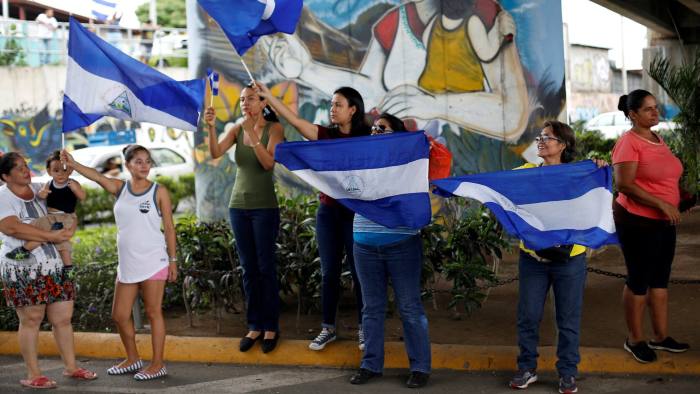Latin America’s socialist support system is crumbling
Economic collapse will eventually break the Cuba-Venezuela-Nicaragua axis
John Paul Rathbone

Nicaraguan demonstrators protest against President Daniel Ortega's government in Managua on Sunday © Reuters
A domestic flight crashed in Cuba last month, killing more than 100. The next day, President Nicolás Maduro held mock elections to seal his grip on Venezuela, a country that thousands of his citizens flee from every day. In Nicaragua 10 days later, 19 died after gunmen opened fire on a Mother’s Day march against President Daniel Ortega.
As well as these costs to life, Venezuela, Cuba and Nicaragua have much in common as members of a gaseous project that Hugo Chávez called “21st century socialism”.
For many years, they provided mutual support and learnt from each other’s systems of social control. Suborning the courts and electoral authorities, destroying the opposition, making national parties personal fiefs, they turned their countries into elected dictatorships. That kept them in power, but did nothing for their economies, which are now crumbling — perhaps decisively so.
That is especially so in Venezuela. The Cuban advisers employed by Mr Maduro to maintain political control have no economic expertise, especially in such a corrupt country. Despite the world’s largest energy reserves, Venezuela is wracked by hyper-inflation, shortages and default.
Crucially, oil output has collapsed to a 33-year low. This has sapped Caracas of the oil it once sold to feed its population, and the funds it once sprayed around to buy regional support, including to Cuba and Nicaragua.
Cuba’s Soviet-style economy is also on the ropes. A partial reversal by US president Donald Trump of the detente begun by his predecessor has damped foreign investor interest and curbed tourism. But Venezuela’s inability to supply Havana with subsidised oil has hurt more.
To help its closest ally, Caracas has reportedly spent $440m of scarce foreign reserves to buy crude on international markets, which it then shipped to Havana on soft terms. But that will not reverse years of economic dilapidation: the plane that crashed tragically was an old Boeing 737, leased because much of Cuba’s fleet is grounded for lack of spare parts.
Nicaragua’s economy is in better health — although, ironically, that may make Mr Ortega the weakest of the three.
Rather than nationalise businesses, the 72-year-old Mr Ortega let the private sector be, so long as it stayed out of politics. He implemented a US trade deal, which attracted investment and turned Nicaragua into a low-cost textiles exporter. He also bought billions of dollars of subsidised oil from Venezuela, which then returned the funds as loans funnelled through a bank owned by the ruling party.
But Venezuela can no longer provide cheap oil, so Mr Ortega cannot buy the same domestic support he once did. Since April 18, when protests against the president first erupted, business has also worked to see him go. “Nicaragua needs as early an exit as possible,” said José Adán Aguerri, head of the largest business chamber, last week.
Crucially, although Mr Ortega heads the police and armed forces, the military has stayed neutral and could play a central role in a transition. It is less co-opted than the Venezuelan army. It is also more independent than Cuba’s military, where the revolution is deeply institutionalised.
“Nicaragua’s army is in many ways the opposite of Venezuela’s,” said Evan Ellis, professor of Latin American studies at the US Army War College. “It began as a revolutionary force and has gradually become more institutionalised and professional. The Venezuelan army was once professional and institutionalised but has since become corrupt.”
Change may well not come any time soon. After all, Caribbean dictatorships are historically long-lasting. The Cuban regime has endured for almost 60 years, Venezuela’s for 19, and Mr Ortega’s latest spell as president is 11 years so far. But international condemnation is growing, especially of Venezuela, which is being investigated by judges in The Hague for possible crimes against humanity.
Perhaps the only silver lining to this desperate situation is that it is that increasingly rare thing in the hemisphere: an issue in which much of the region and US have common cause.
0 comments:
Publicar un comentario